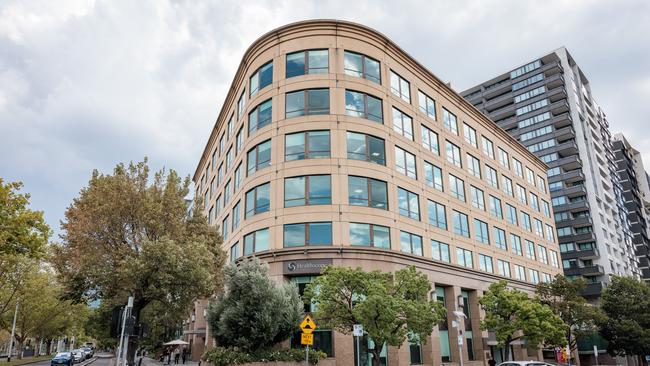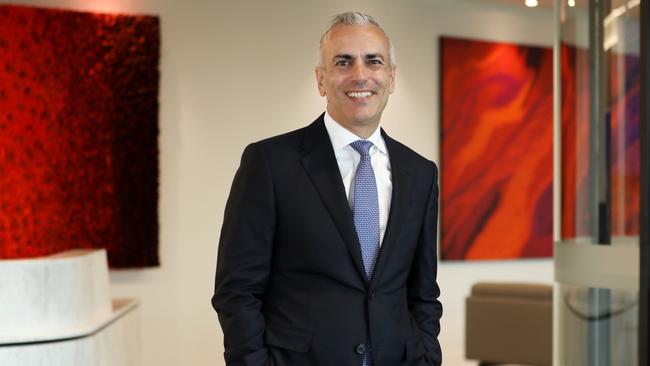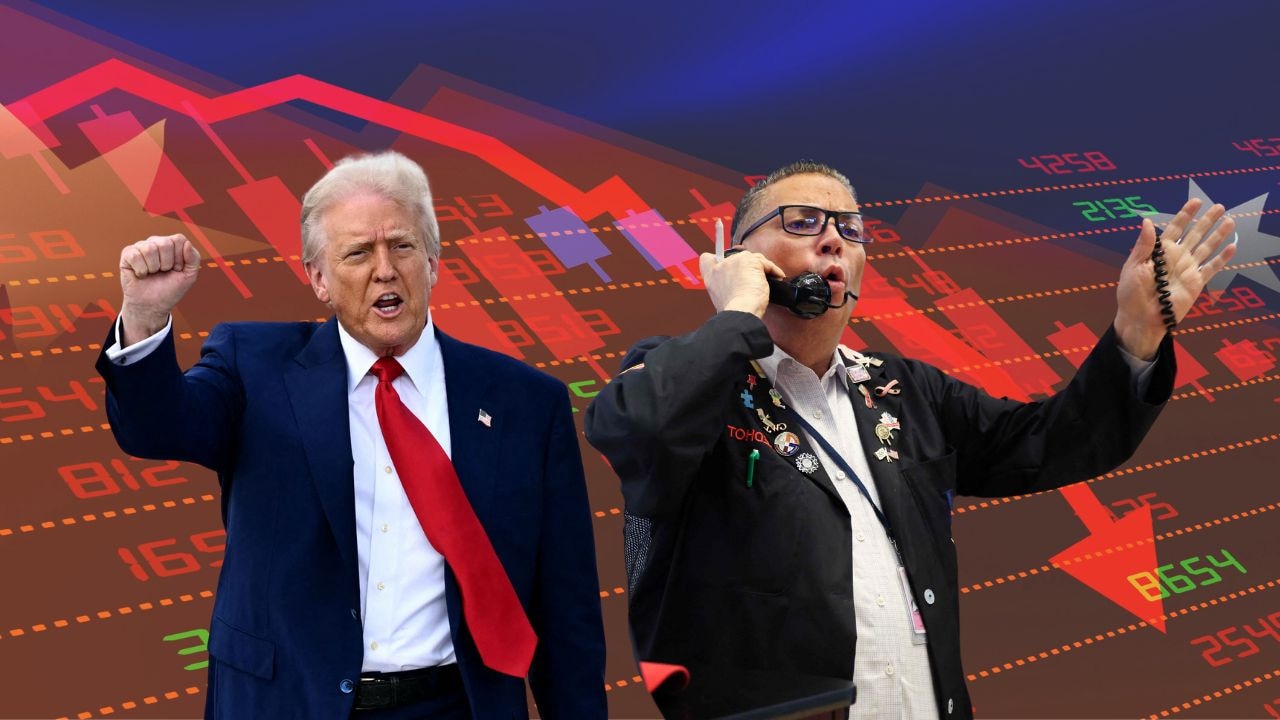HMC Capital reaps $150m dividend from private equity fund to prepare for Healthscope tilt
David Di Pilla’s HMC Capital is revving up to buy troubled private hospital operator Healthscope from Brookfield. After a profitable year on the sharemarket, he has the capital to do it.

Business
Don't miss out on the headlines from Business. Followed categories will be added to My News.
David Di Pilla’s HMC Capital has formalised its ambitions to take over ailing private hospital operator Healthscope and declared it has hundreds of millions of dollars to deploy on a tilt at the nation’s second-biggest clinical group.
The listed investment manager controlled by Mr Di Pilla on Tuesday unveiled plans to put possible ownership of the hospital business into its revamped private equity fund if it is able to wrest control from Healthscope’s parent, Canadian group Brookfield.
A property fund managed by HMC is presently a landlord to Healthscope.
HMC flagged that it would work with a consortium of investors in any move on Healthscope and is confident that it can secure control of the business, even as it goes up against hedge funds vying for its $1.6bn debt pile.
The deep discounts at which the debt is trading at has sparked concerns about a potential break-up of Healthscope, but Brookfield has some breathing space as about 70 per cent of the debt holders are locked in until May. In that time it could achieve either a full sale or a recapitalisation.
Investors have pummelled HMC shares over the last month as its interest in Healthscope becomes clearer and valuations for its satellite funds wilt. The data centre developer and operator DigiCo REIT and HealthCo Healthcare and Wellness REIT – the landlord to Healthscope – have plunged.
Brookfield, advised by investment bank MA Financial, is testing the market in an attempt to smoke out alternative bidders, or give Brookfield a chance to restructure Healthscope.
Mr Di Pilla said that the $500m revamped HMC private equity fund could raise another $100m, but would not require much more backing as it aimed to realise some profits from successful investments.
HMC believes Healthscope can recover despite the broader squeeze on the industry from lower occupancy, rising operating costs and tension with private health insurers over patient coverage.
“I think at the right price that will make sense; it’s still got great infrastructure characteristics, it’s still an essential piece of the private healthcare landscape in Australia, and we think with the appropriate capital structure, it can be a viable business again,” Mr Di Pilla said.
HealthCo and an unlisted fund are landlord to 11 Healthscope hospitals. The other landlord Healthscope rents facilities from is Canada’s Northwest Healthcare Properties REIT.
Mr Di Pilla insisted that the interests of HealthCo unitholders would be kept separate from a play for the hospital operator.
“We have to look at it through a separate lens … it’s got to stack up as an equity investment and we’ve also got a duty to our HealthCo investors to make sure we get them the best outcome as well,” he said.
“We have to just look at both rationally and in their own right,” he said. “Does the fact we’ve got good existing knowledge of the situation help? Potentially, but we have to look at both sides of the coin independently.”
HMC flagged that it wants to solve the problems that have pushed Healthscope to the brink.
“We just think that as a going concern, it’s part of the social fabric … getting it into a form where it’s got the right capital structure just makes eminent sense to us, and we end up in a better place if we can pull it off,” he said.
Mr Di Pilla acknowledged investor criticism of the approach for the hospital operator and of the performance of HMC’s other listed companies, but pointed to the exceptional performance of the private equity fund which generated a $300 million dividend, $150 million of which will be allocated to HMC Capital in its capacity as shareholder.
That vehicle, HMC Capital Partners Fund I, will house part of the target company.
“When you’re playing the long game and building a forever business, you just have to suck it up and keep pushing ahead,” he said.
The market is yet to get behind HMC’s hospital ambitions, and investors will seek further details at a forthcoming investor day on Thursday. HMC shares dropped by 22c to $6.01, DigiCo dropped 3c to $2.97, and HealthCo added 1c to 90c on Tuesday.
A strategy to exit key investments in HMC’s flagship fund by selling off stakes in listed groups Sigma Healthcare and Ingenia are largely behind the $300 million windfall.
This will leave the fund cashed up to pursue other opportunities amid a broader shake-out of public and private valuations.
HMC’s dividend shows its business model is succeeding in the face of its own battered share price, vindicating its track record of buying assets, restructuring, and selling them profitably.
“HMC Capital Partners Fund I has proven our ability to deliver outsized and uncorrelated returns for investors by applying a private equity mindset to investing in listed equities,” Mr Di Pilla said, noting it could target both listed and unlisted opportunities.
“We have refined the strategy and structure of Fund II to maximise potential returns for investors. HMCCP Fund II will target our highest conviction investments in a more traditional closed-end private equity fund structure,” he said, in a reference to assets like Healthscope.

If it was successful in a forthcoming auction, “it is intended that any participation in a Healthscope investment would be conducted through HMCCP Fund II”.
DataRoom revealed last month that HMC has been pursuing Healthscope.
As part of the restructure of its private equity fund, HMC’s balance sheet is expected to next month have no debt and $675m of committed and undrawn funding lines to back fresh deals. The company said the return was consistent with its strategy to recycle capital and generate a strong return on equity.
The revamp will also see it become a more typical vehicle in that industry: It will now chase a concentrated portfolio of HMC’s best ideas rather than seeking to diversify into up to ten positions. It will also be able to chase other unlisted deals that are too good to refuse.
HMC will get its $150m in mid-April and will keep an ongoing investment valued at about $230m in the Fund I.
It was also the best performing Australian equity fund in 2024 as ranked by Morningstar, delivering more than 55 per cent by way of returns.
HMC is separately setting up its first energy transition fund which is on-track to settle on the Neon Victoria portfolio, and it is fundraising with domestic super funds and international institutional investors participating in due diligence.
HMC said annualised fiscal year 2025 operating earnings per security was currently tracking at 70c before tax.
Originally published as HMC Capital reaps $150m dividend from private equity fund to prepare for Healthscope tilt



